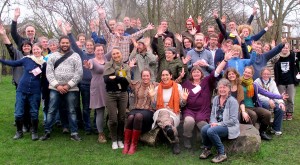 Educational Structures in Denmark
Educational Structures in Denmark Recently, growing interest in permaculture courses is evident. In Denmark, private teachers organise presentations, introduction courses, specialised courses and PDCs.
Recently, growing interest in permaculture courses is evident. In Denmark, private teachers organise presentations, introduction courses, specialised courses and PDCs.
The PDC is 72 hours with 70% international curriculum and 30% local focus.
Denmark, Norway and Sweden share the same educational structures under the Nordic Institute. The annual Nordic Meeting is the frame for diploma accreditations and discussions on how education in permaculture in the Nordic countries should develop.
Table of contents
- Permaculture organisations, courses and teachers in Denmark:
- Permakultur Danmark
- Want to add your info here? [Press this]
- Questionnaire Educational Structures 2012
- Update – How have the Permaculture Educational Structures changed in Denmark in the years 2012 – 2014?
- Strengths, Weaknesses and Opportunities (PDF)
Update – How have the Permaculture Educational Structures changed in Denmark in the years 2012 – 2014?
Cathrine Dolleris, Danish Permaculture Association, May 2014, Interviewed by Tanja Korvenmaa
In two years, the demand for permaculture education in Denmark has grown a lot. There are also more permaculture teachers, more courses, more capacity to teach. The Danish association does not provide training directly, but there are private teachers that do - and the association promotes them. There are now six teachers when two years ago there were two, and they are offering introductory courses, PDCs, forest garden courses and courses on perennial vegetable gardens.
The network of teachers has grown stronger due to the European Teachers Network partnership and cooperation with the UK association and cooperation with the other Nordic countries. The new connections, the conversations and the space and time to develop teaching materials have brought ...
By meeting teachers from other countries at EPT meetings and learning from their experiences, it has come clear that the current Diploma pathway in Denmark could be much better and easier to access. Some important changes in that structure are about to happen very soon.
One of the key moments of EPT for Cathrine was the presentation by Andy Goldring about LAND centers of the UK - she got the inspiration to bring the idea to Denmark. The hands-on learning centers are important because informal, practical permaculture learning happens best in distributed, land-based campuses: learning by doing, experiencing, observing and thinking together.
A new kind of a structure to enable this new form of education is needed: advisors, educators; consultants, designers; funding and accreditation systems - the work to create LAND centers to Denmark has been started.
- Log in to post comments
